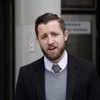Retired Army Gen. Lloyd Austin testifies at his confirmation hearing before the Senate Armed Services Committee at the U.S. Capitol on January 19, 2021 in Washington, DC. (Photo by Greg Nash-Pool/Getty Images)
In a call marking the first time in months since top U.S. and Russian military officials spoke on the record, U.S. Secretary of Defense Lloyd Austin III urged his counterpart, Sergei Shoigu, to consider a ceasefire in Ukraine.The Pentagon released a readout of the unannounced meeting between the two Friday morning, the first since Russia launched its war in Ukraine 79 days ago, which lasted approximately an hour.“Secretary Austin urged an immediate ceasefire in Ukraine and emphasized the importance of maintaining lines of communication,” Pentagon spokesman John Kirby said in a statement, noting that the last time the two spoke was on Feb. 18, eight days before the Kremlin launched its invasion of Ukraine.Communications between Shoigu and Austin comes amid increased fear of nuclear war between Russia and NATO nations, which might add Finland and Sweden in the coming weeks, putting the military alliance originally created to be a force against the Soviet Union on the doorstep of Russia. The Kremlin has been clear that if those two nations were to join NATO, it could necessitate a military response from Russia on the grounds that the move imperiled its national security interests. The call marked the first time a major official in the U.S. government has parlayed with the Kremlin in an official, meaningful way since the war started. President Joe Biden last spoke to President Vladimir Putin in early February and has refused to since, while Secretary of State Antony Blinken—who cancelled a meeting with Russian Foreign Minister Sergei Lavrov in the lead-up to the invasion—hasn’t officially spoken to a top diplomat from the Kremlin in months.
